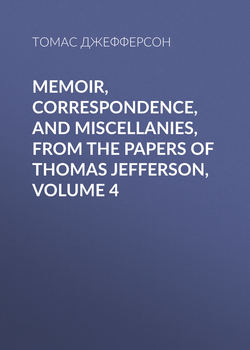Читать книгу Memoir, Correspondence, And Miscellanies, From The Papers Of Thomas Jefferson, Volume 4 - Томас Джефферсон, Thomas Jefferson - Страница 5
LETTER V.—TO ROBERT R. LIVINGSTON, November 4,1803
TO ROBERT R. LIVINGSTON
ОглавлениеWashington, November 4,1803.
Dear Sir,
A report reaches us this day from Baltimore (on probable, but not certain grounds), that Mr. Jerome Bonaparte, brother of the First Consul, was yesterday1 married to Miss Patterson of that city. The effect of this measure on the mind of the First Consul, is not for me to suppose; but as it might occur to him primâ facie, that the executive of the United States ought to have prevented it, I have thought it advisable to mention the subject to you, that if necessary, you may by explanations set that idea to rights. You know that by our laws, all persons are free to enter into marriage, if of twenty-one years of age, no one having a power to restrain it, not even their parents; and that under that age, no one can prevent it but the parent or guardian. The lady is under age, and the parents, placed between her affections which were strongly fixed, and the considerations opposing the measure, yielded with pain and anxiety to the former.
Mr. Patterson is the President of the bank of Baltimore, the wealthiest man in Maryland, perhaps in the United States, except Mr. Carroll; a man of great virtue and respectability; the mother is the sister of the lady of General Samuel Smith; and, consequently, the station of the family in society is with the first of the United States. These circumstances fix rank in a country where there are no hereditary titles. Your treaty has obtained nearly a general approbation. The federalists spoke and voted against it, but they are now so reduced in their numbers as to be nothing. The question on its ratification in the Senate was decided by twenty-four against seven, which was ten more than enough. The vote in the House of Representatives for making provision for its execution, was carried by eighty-nine against twenty-three, which was a majority of sixty-six, and the necessary bills are going through the Houses by greater majorities. Mr. Pichon, according to instructions from his government, proposed to have added to the ratification a protestation against any failure in time or other circumstances of execution, on our part. He was told, that in that case we should annex a counter protestation, which would leave the thing exactly where it was; that this transaction had been conducted from the commencement of the negotiation to this stage of it, with a frankness and sincerity honorable to both nations, and comfortable to the heart of an honest man to review; that to annex to this last chapter of the transaction such an evidence of mutual distrust, was to change its aspect dishonorably for us both, and contrary to truth as to us; for that we had not the smallest doubt that France would punctually execute its part; and I assured Mr. Pichon that I had more confidence in the word of the First Consul than in all the parchment we could sign. He saw that we had ratified the treaty; that both branches had passed by great majorities one of the bills for execution, and would soon pass the other two; that no circumstances remained that could leave a doubt of our punctual performance; and like an able and an honest minister (which he is in the highest degree) he undertook to do, what he knew his employers would do themselves, were they here spectators of all the existing circumstances, and exchanged the ratification’s purely and simply; so that this instrument goes to the world as an evidence of the candor and confidence of the nations in each other, which will have the best effects. This was the more justifiable, as Mr. Pichon knew that Spain had entered with us a protestation against our ratification of the treaty, grounded, first, on the assertion that the First Consul had not executed the conditions of the treaties of cession, and secondly, that he had broken a solemn promise not to alienate the country to any nation. We answered, that these were private questions between France and Spain, which they must settle together; that we derived our title from the First Consul, and did not doubt his guarantee of it: and we, four days ago, sent off orders to the Governor of the Mississippi territory and General Wilkinson, to move down with the troops at hand to New Orleans, to receive the possession from Mr. Laussat. If he is heartily disposed to carry the order of the Consul into execution, he can probably command a volunteer force at New Orleans, and will have the aid of ours also, if he desires it, to take the possession and deliver it to us. If he is not so disposed, we shall take the possession, and it will rest with the government of France, by adopting the act as their own and obtaining the confirmation of Spain, to supply the non-execution of their stipulation to deliver, and to entitle themselves to the complete execution of our part of the agreements. In the mean time, the legislature is passing the bills, and we are preparing every thing to be done on our part towards execution, and we shall not avail ourselves of the three months’ delay after possession of the province, allowed by the treaty for the delivery of the stock, but shall deliver it the moment that possession is known here, which will be on the eighteenth day after it has taken place.
Accept my affectionate salutations, and assurances of my constant esteem and respect.
Th: Jefferson.
1
November 8. It is now said that it did not take place on the 3rd, but will this day.
